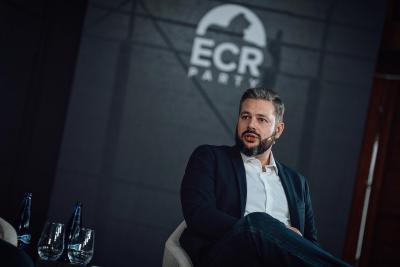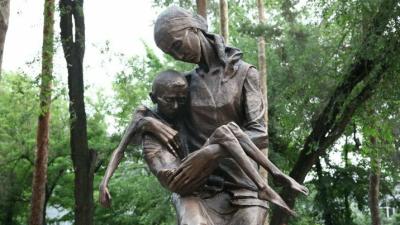Rubén Pulido served in the Air Force for 11 years. During that time, he also completed various military advanced training courses, obtained a Master's Degree in International Relations at UCAM, and was awarded the Medal of Merit and Sacrifice. During his career outside the military sphere, he has advised various organisations on immigration issues. He has been Director of communication for the VOX Parliamentary Group in Andalusia and currently works as a political analyst for the Disenso Foundation, collaborating with different media outlets and public entities.
Álvaro Peñas: It is winter, and when following the news, we get the impression that there are practically no arrivals of illegal immigrants.
Rubén Pulido: Yes. I’ve checked the data very faithfully and it is true that there has been a decrease in illegal immigration compared to last year. However, this does not mean that the problem has ceased to exist. In places like the Canary Islands, we have exceeded the figures for 2018, 2019, 2020 and have almost the same number of migrants as in 2021. As of today, there are already more than 1,800 illegal immigrants arriving in the Canary Islands, figures that would have been unthinkable four or five years ago. This migratory wave is arriving in 90% of cases from the coasts of Morocco or the coasts of Sahara under Moroccan police and administrative control. This may be the reason why we don't hear about that in the media. If there is one thing the government is doing well, it is trying to hide the problem originating in the Kingdom of Morocco. We don't know anything about it because, in theory, right now, there is a great friendship with Morocco and their regime is controlling illegal immigration. But the reality is very different and the pressure continues in Ceuta and Melilla. Especially in Ceuta, where attempted assaults have been occurring almost daily since the beginning of the year. In January, a dozen attempts were reported. They were controlled, since only a few hundred of sub-Saharans were involved. Yet everything can change, as happened last year in Melilla.
So, the situation at the border fences does not seem to have changed at all.
Right. There is daily movement behind the border crossings. For the time being, there is a small population of sub-Saharan origin trying to enter Ceuta every week, while in Melilla there are more Moroccan migrants. All of them use their mobile phones to communicate where there is no border control and then attempt crossing. So far this year, some 50 illegal immigrants have managed to cross the fences. Moreover, if they fail, nothing happens and they can try again because the Moroccan authorities do not return them to their place of origin - they do nothing to dissuade them. This is how large pockets of illegal immigration are created - such as the one I pointed out in September 2021 around Melilla, which led to massive assaults in 2022.
Do the camps from where the assaults started still exist?
Those camps were on Mount Gurugú, and after what happened last year, they were dismantled by Morocco. A couple of weeks ago I was able to talk to people who have explored the area and there is nothing there. In any case, if you don't take the right measures, when you close an area the migratory flows go elsewhere. What is happening in Ceuta may be the result of this situation and, in the future, a scenario identical to that in Melilla could be repeated in Ceuta. This, like what happened last year, is totally avoidable. If I can see this situation, so can the Moroccan authorities and they have the capacity to prevent it.
As a result of the disagreement with Algeria over our government's support for Morocco on the Sahara issue, the arrival of illegal immigrants from that country to the Balearic Islands began. What is the situation like?
The Balearic situation is perhaps the one that has gotten the most out of hand for the government. No thought is being given to what might happen, nor to the possibility of something similar to what happened years ago in Lampedusa, because the distances from Algiers to the Balearic archipelago are very similar. This situation is being ignored and, as a result of this ineptitude, illegal immigration to the Balearics is skyrocketing. In 2018, there were barely a few dozen arrivals, and in recent years the number of illegal immigrants has surpassed the 2,000 mark. To give us an idea at a percentage level, illegal immigration has increased by around 1,300% since 2018. When maritime conditions are favourable, boats continue to leave from the area around Algiers. Regarding the control of illegal immigration, Algeria has its lights and shadows, but it is true that this has nothing to do with Erdogan or Mohammed VI, or other regimes of this kind. Many immigrants pass through Algeria, and every week, there are arrests related to the expansion of illegal immigration mafias. In other words, Algeria is aware of the dangers of migratory flows and is taking measures to stop them. What Algeria does demand is reciprocity in diplomatic relations, which is what Spain should ask Morocco for because such reciprocity is currently non-existent.
When there was a rift with Algeria over the Sahara issue, several Algerian diplomats told me that they were witnessing that the use of migratory flows as a weapon of political pressure was very efficient, but that at the moment, they were not considering using them. However, though Algeria controls the flow of sub-Saharans, it is doing nothing to prevent the flight of people with more dangerous profiles. They include both Algerians and people coming from Iraq or areas with a high degree of radicalism, and even former members of jihadist cells. In the Balearic Islands, Algerian immigrants are arrested almost every week for occupation, threats, mugging, etc. Unfortunately, the diplomatic distance from Algeria is currently unbridgeable.
The latest jihadist attack in Spain, the murder of a sacristan in Algeciras, was committed by a Moroccan immigrant with an expulsion order. Spain said that Morocco had not collaborated, and the Moroccan reply was that they had never received the expulsion request. How is this possible?
This case says a lot about the nature of diplomatic relations between Spain and Morocco. We are told that they are smooth and excellent, that Morocco is a loyal and wonderful partner - but this shows that in terms of police collaboration, there is absolutely nothing. If the expulsion dossier was formalised in June last year and has not reached Morocco yet, where are these smooth relations? Before the current socialist government came into power, what did work well between Spain and Morocco was police collaboration. In fact, many of the operations against jihadist terrorism carried out in southern Spain are the result of this previous collaboration. Unfortunately, this happens very frequently. In Spain there are many Moroccan citizens with valid expulsion orders, and others are banned from entering Spanish territory for having committed crimes there. Moreover, many of them apply for political asylum when they are about to be expelled. For example, when recently, the National High Court proposed the expulsion of a Moroccan, his defence used the application for asylum on the grounds of political persecution to paralyse the expulsion process. In other words, a misuse of the Asylum Law is allowed.
But when a murder occurs, as happened in Algeciras, is there no one responsible?
The lack of control is absolute, and I can give a very recent example, which occurred in Ávila on 11 February. An illegal immigrant of Moroccan nationality was arrested while carrying 4 kg of hashish. This subject had a ban on entering our country for a period of five years after having been expelled for having been involved in drug trafficking. This can only happen in our country.
With regard to jihadism, news of arrests is less frequent; what is the situation?
It should be noted that since 2020, 16 jihadists have been arrested who had used illegal immigration channels to access national territory. Here we have something that we cannot ignore: namely, jihadism is using illegal immigration networks to enter Spain and Europe. With regard to arrests, the truth is that they are increasing: in 2019, 8 jihadists were arrested; in 2020 we went from 8 to 38; in 2021 there were 40 arrests, and last year there were 53. In other words, the number of people arrested for international terrorism has increased, and so far this year, there are already 14. Fortunately, the state security forces are working very well and are able to carry out their operations and make these arrests, despite the fact that there are not enough police forces.
The Algeciras case could have been avoided if they had had the means to control this subject and had detected that he was becoming radicalised. The Ministry of the Interior tells us that the radicalisation process had been express. This is unheard of because I know of no case of express indoctrination. The truth is that it is a process that takes place over a period of months in which material of a jihadist nature is consumed and the subject changes his habits. Given political will, many things can be avoided.
Countries such as Poland and Hungary have been very successful in curbing illegal immigration. What model do you think Spain should follow?
Each country has its own political and geographical characteristics, but the big problem we have here is the aggressive nature of Morocco's diplomatic relations. As well as its capacity to use threats and blackmail, which makes us think that there is something we don't know that makes our government drop their trousers time and time again. I believe that the first thing Spain should do is to resolve these diplomatic differences, and this can only be done by using tools capable of balancing these relations. For example, we have hot returns, even endorsed by the European Court of Human Rights and also by our Constitutional Court. Why are hot returns not used? When a boat is intercepted 20 nautical miles off the coast of Morocco, Maritime Rescue or even the Navy, if this is necessary in an emergency situation, on the basis of maritime law and international law, have the right to take these illegal immigrants back to the nearest safe port - to Morocco, and carry out this hot return.
In short, determination is the most important thing in these political actions to control illegal immigration. I am not talking about starting a conflict, because we are going to get into a conflict if we are not able to stop what is happening right now in a timely manner. If the more than 50 sub-Saharans who, as I mentioned before, have entered Ceuta, are arrested as soon as they cross the fence and are handed over to the Moroccan authorities, the problem would begin to be solved. We have to send the right political message and to show the right deterrent effect, proving that we are acting in the right way. We have to reach a point when we tell Morocco and Algeria that they no longer control illegal immigration, that they have made a mistake by subrogating that responsibility and that we are now going to be an active part of it. Because in the end, the destination is the national territory, the destination is my borders and, as they are my borders, I have to take an active role in controlling the migratory flow.
Read also
“Everything people know about Crimea comes from Russia and most of it is a lie”: An interview with Lia Motrechko
Lia Motrechko is a young activist for the rights of the Crimean Tatars. The daughter of a Ukrainian father and a Tatar mother, she lives in Spain where she studies history.
Álvaro Peñas
The divine fool
On 2 May 1808, while blood was still being shed in the streets of Madrid, Napoleon dined in Bayonne with the “kings” of Spain, Charles IV and his son Ferdinand VII.
Álvaro Peñas
The Goloshchokin genocide, the unknown Kazakh Holodomor
The Second Congress of Victims of Communism took place in Madrid, organised by the Institute of Historical Studies (CEU) and the Centre for Studies, Training and Social Analysis (CEU-CEFAS).
Álvaro Peñas
The Martyrdom of the Ulma Family
On 24 March 1944, German police raided the Ulma family farm in Markowa, Poland.














Comments (0)